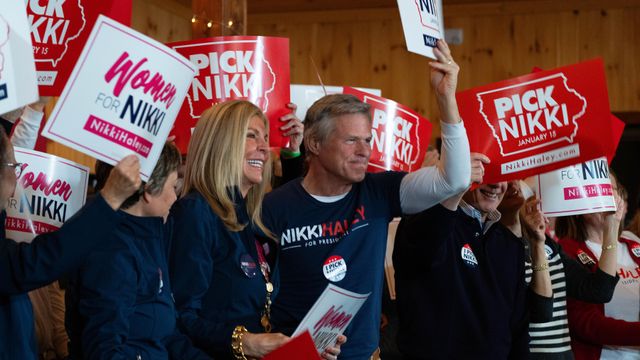Campaigns battle cold and complacency in final rurnout push in Iowa
Nikki Haley’s team predicts Iowans will brave brutal weather to caucus for her. Aides to Ron DeSantis say the subzero temperatures give their candidate an edge because he has the biggest team knocking on doors. And the Trump team says they don’t worry about the cold — former President Donald Trump’s supporters will “walk through glass” to caucus for him.
The truth: No one really knows what to expect Monday night when Iowans become the first to weigh in on the 2024 presidential election. An already unpredictable and quirky process is even more so this year, thanks to dangerously cold weather and an unusually uncompetitive contest.
Until recently, both the Trump and DeSantis teams had been privately preparing for an enormous turnout of more than 200,000 caucusgoers, a figure that would eclipse the party’s previous record of 187,000 in 2016. But as the winter storm blew in last week, nobody from any of the leading campaigns wanted to attach their names to a firm prediction.
The National Weather Service forecast subzero temperatures in Des Moines, with wind chills dropping to as low as minus 30 degrees Monday.
This year’s caucuses are unusual for many reasons beyond the weather. A contest known for elevating long shots has been dominated by the former president for months. What suspense is building is not about the winner, but about the margin of victory and who claims second place.
That has given the affair a subdued, sedated feel. Interviews with voters across the state reveal many are unhappy with their choices, and feel that they’re going through the motions in a simulation of a contest.
Brian Bean, an insurance company owner in Waukee, Iowa, who caucused for Trump in 2016, is not caucusing, he said, citing concerns about some of Trump’s recent speeches and a field of other candidates that had left him unimpressed. While he expects to vote for Trump in November if he is the Republican nominee, “What bothers me about him is he’s not denying that he won’t be vindictive if he’s elected,” Bean said. “And I’ve got a problem with that.”
Some of the discontent is distinctly Iowan, said Bob Beatty, a political science professor at Washburn University in Topeka, Kansas, and an expert on the Iowa caucuses. Voters in the state delight in being courted by candidates and wielding their perceived influence. (In reality, Iowa Republicans have a poor record of picking the recent nominees.)
This year, Iowans have been effectively stripped of their role by Trump’s apparent advantage — a key poll published Saturday showed him winning 48% — and lack of interest in the storied traditions of campaigning in Iowa. Trump’s campaign in the state has been limited to large rallies and he didn’t participate in any of the primary debates.
“He’s not shaking hands, and he’s not taking questions,” Beatty said. “Trump is campaigning as an incumbent, and it’s half working. And if you get half, that’s it.”
Encapsulating the local malaise — albeit from the anti-Trump perspective — the Raygun clothing store in Des Moines is selling T-shirts with the slogan: “Election 2024: You’d think battling a fascist takeover of America would spark more interest from people.”
David Kochel, a longtime Iowa political strategist, predicted about 150,000 Iowans would show up Monday, a figure in line with historical norms, but still just about 25% of the registered Republicans in the state. He cited Trump’s lead and the weather as the biggest factors.
“Iowans can go out when it’s 15, 20 degrees, no problem. They do it all the time, all winter long,” Kochel said. But when it’s “10 below, 20 below — that can get dangerous for people. I mean, cars don’t start, elderly people, frostbite.”
Voters cannot participate on their own schedule. To caucus, voters must show up at their local caucus site at 7 p.m., listen to speeches from candidates’ supporters and write down their preference. The process can be quick — or not.
Some would-be caucusgoers, looking at the forecast, were having second thoughts.
Anthony O’Malley, 61, a retired Army veteran and a Republican-leaning independent in Waterloo, Iowa, said he was considering registering as a Republican in order to caucus on Monday, and was deciding between Trump and Haley. But the combination of a recent surgery and the weather had changed his mind.
“It ain’t worth it,” he said.
Kochel, who is not aligned with a campaign, said he believed lower turnout would benefit Trump’s rivals. Polls show Trump is more popular with people who are considering caucusing for the first time this year, a group that might be easily deterred by the weather.
That’s a view shared by the DeSantis operation, which has spent weeks boasting of its get-out-the-vote machine. The well-funded super political action committee backing the governor, Never Back Down, has spent tens of millions of dollars on voter outreach in the early states — outspending any of DeSantis’ rivals. Over the past seven months the DeSantis super PAC has identified every potential DeSantis voter in Iowa and visited their homes multiple times. It has collected reams of data on these voters, studied what would be required to get them to caucus for DeSantis — whether they need a ride or some extra encouragement from a neighbor. It says it has enlisted 1,600 precinct captains ready to organize caucusgoers Monday.
An adviser for the Trump campaign, Chris LaCivita, scoffed at the idea that bad weather was good for DeSantis.
“It’s laughable that weather would have a greater impact on first-time caucusgoers,” LaCivita said, claiming the campaign’s voters had an extraordinary level of commitment. “When Trump says most people will walk through glass to vote for him, he’s not joking.”
Asked whether the Trump campaign was doing anything to ensure their voters showed up to caucus in the subzero temperatures, LaCivita said that months ago they began recruiting drivers with four-wheel-drive vehicles to give neighbors rides to caucus sites.
Trump’s campaign has been outspent by DeSantis. But, unlike in 2016, when Trump lost Iowa to Sen. Ted Cruz of Texas, the former president has built a professional campaign operation.
The campaign says it has around 2,000 caucus captains — identifiable by their signature gold and white caps, which have already become a coveted collector’s item in Iowa political circles. Many of these volunteers have been given formal training and each has been tasked with bringing 10 Iowans to caucus for Trump.
Trump also benefits from intensely loyal fans, some of whom have driven many miles to help him out, without having any contact with the campaign.
Edward Micheals, 66, a truck driver, said he drove from his home in Dallas, Texas, to volunteer. “We don’t want to take any chances,” he said in an interview at the Machine Shed restaurant in Urbandale on Thursday, where the former president’s eldest son, Donald Trump Jr., rallied supporters.
Amid all of this uncertainty, the biggest wild card is Haley.
Until late November, she had almost no campaign staff on the ground in Iowa. But then the political network founded by billionaire industrialist brothers Charles and David Koch endorsed her and handed over their organizational muscle and financial heft. The group, Americans for Prosperity Action, has been knocking doors across Iowa for Haley, trying to reassemble the coalition of wealthier, college-educated Republicans that brought Sen. Marco Rubio of Florida close to victory in a fast finish in the 2016 Iowa caucuses.
The weather may play to her advantage with that group. Those voters are concentrated in urban areas, where roads have been cleared and it will be easier for them to get to a caucus site. It’s unclear which factor will matter more in her fight with DeSantis for second place.
“If you put a gun in my head right now, I would probably rather be Nikki Haley because she has had the better trajectory than DeSantis over time,” Kochel said, referring to the battle for second place. “But boy, I wouldn’t bet a mortgage payment on it right now.”
This article originally appeared in The New York Times.










